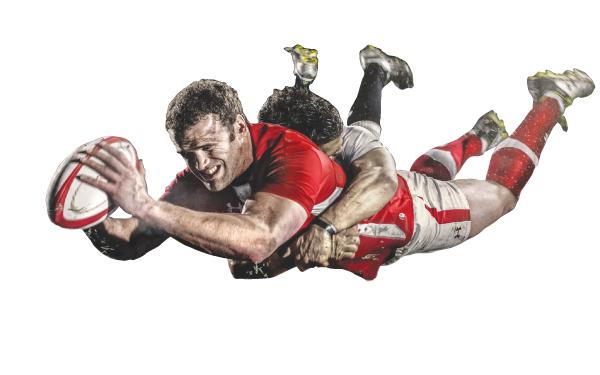
The origins of the game, now known across the world simply as ‘Rugby’, can be traced back over 2,000 years. The Romans played a ball game called harpastum, a word derived from the Greek word ‘seize’, the implication of the name being that somebody actually carried or handled the ball.
It was during a match on the Close in the autumn of 1823 that the face of the game changed to the one which is recognisable today. A local historian described this historic event as “with a fine disregard for the rules of the game as played in his time, William Webb Ellis first took the ball in his arms and ran with it, thus originating the distinctive feature of the Rugby game.”
The fame of the game spread quickly as the Rugby School boys moved onwards and upwards, first to the universities of Oxford and Cambridge. The first university match was played in 1872.
From the universities, the graduating teachers introduced the game to other English, Welsh and Scottish schools. Scotland played England in the first International game at Raeburn Place, Edinburgh in 1871.
In 1900, the Rugby Union was introduced to the Summer Olympics by Pierre de Coubertin, who had previously refereed the first French Domestic Championship as well as France’s first International game. France, Germany and Great Britain all entered teams for the Olympics, and France won gold by defeating both opponents. Rugby actually drew the largest crowd during the Summer Olympics.
The game is broken down into two 40 minute halves with a 10-minute rest period in between. It has no stoppage time and will end exactly in 80 minutes. Each team can start with 15 players and up to sevein substitutes. Players who have left the field are only allowed to return if they have been treated for an injury. A Rugby field, also known as a pitch, is 110 yards long, with two 25 yard in-goal areas and is 77 yards wide.
There are lines on a Rugby field in addition to the goal lines, also lines 25 yards from each goal line. These are referred to as the 22 metre lines. The halfway line splits the field and two 10 metre lines run parallel to the halfway line on either side. There are also two lines that run the length of the field five metres from the touch lines.
The rugby ball seems to be the only thing in the game that doesn’t have a nickname,e it’s just called ‘the ball’. The sport has plenty of star players, but rugby is truly a team sport and the main five positions of the team are Prop, Number 8, Scrum half ,Fly half and Wing.
I began Rugby when I was just seven years old. My dad used to play Rugby for his College which led to my fondness for the sport. He was also my first coach and still is my mentor. I enjoy the times when my dad and I watch matches on the television and argue about the simplest things but share the same sentiments at the end.
Rugby is a gentleman’s game played worldwide. My dream is also to play for Sri Lanka one day. With the prevailing situation we are compelled to restrict our playing and we have missed the Rugby season for the last two years but our team uses online as a great way not only to interact but also to keep fit.
Currently, I play for the U14 for my College. is basically a new game for us with the change in rules and regulations of the game, as we grow older it becomes more thought-provoking. Besides all obstacles I still look forward to getting back to the field to just feel the Rugby ball and to hear our coaches roar at us with intentions of motivation and hard training, pushing us to our limits.
This, however, beats the sentimentality of playing a game with my teammates striving to geta win for College.
My favourite International team is ‘THE ALL BLACKS’ who are known for their playing and game strategies. Being a small island team they are still the best in the world because they play as a team. With this sport I have learnt not only good sportsmanship but also how to be a real team player. There is quote which I believe in when playing Rugby and wish to end this article with it,
‘ONCE YOU BECOME FEARLESS, LIFE BECOMES LIMITLESS’.
Mckyle Karunaratne
Grade 9
S.Thomas’College
Mount Lavinia
